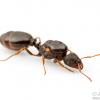I don’t know why they won’t grow anymore.
I was also wondering if they will eat seeds, i know they will eats seed husks, but I don’t know about seeds.
Any help appreciated!
Edited by Will230145, February 25 2018 - 11:02 AM.

Edited by Will230145, February 25 2018 - 11:02 AM.
I'm not sure on seeds as most lasius don't have large mouth parts for it
I'm not sure if any ant eats seed husks without eating the seed inside. Seed husks aren't very edible or nutritious.
As for queens laying 20 eggs and not 10, there's no specific predefined number for the amount of eggs laid in most species, in the case of Lasius 20 sounds about right. Also assuming this is at room temperature two weeks is too early for pupae or larvae. Lasius should take around 2 or so months to get their first workers.
Proverbs 6:6-8 New International Version (NIV)
6 Go to the ant, you sluggard;
consider its ways and be wise!
7 It has no commander,
no overseer or ruler,
8 yet it stores its provisions in summer
and gathers its food at harvest.
Proverbs 6:6-8 New International Version (NIV)
6 Go to the ant, you sluggard;
consider its ways and be wise!
7 It has no commander,
no overseer or ruler,
8 yet it stores its provisions in summer
and gathers its food at harvest.
0 members, 0 guests, 0 anonymous users